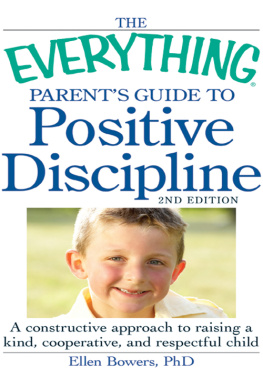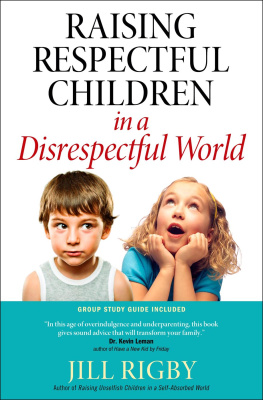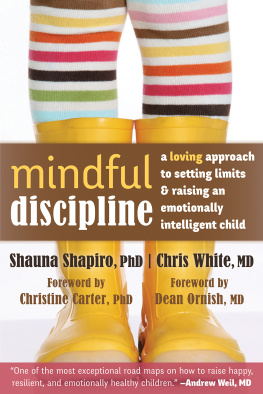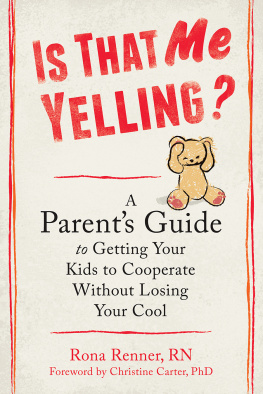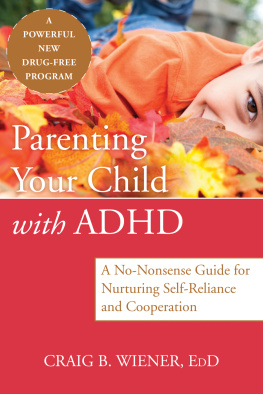Contents
Guide
The Conscious Parents Guide to Positive Discipline
A mindful approach for building a healthy, respectful relationship with your child
Jennifer Costa

Avon, Massachusetts
Introduction
Being a conscious parent requires more than just offering caregiving. Conscious parenting is a nurturing and educational process that allows you to build strong bonds and help your child develop from a completely dependent infant to an independent, self-confident adult. Nurturing is a matter of expressing love. Education is a matter of training. Balanced parents offer a healthy mix of love and training. Providing one or the other is not enough.
As a parent, discipline is your responsibility. Your job involves helping your child develop appropriate beliefs and behaviors as a result of your example and guidance. The definition of right and wrong in your family depends on the values that you carry into parenthood from your own background and experiences. No two families are the same when it comes to beliefs and standards.
Becoming a first-time parent can be a humbling experience. Its easy to feel overwhelmed and think that you dont have what it takes to raise a child. The truth is, children teach you how to parent as they grow. Chances are, you know more than you think you do. Here are six As that most children want from their parents as they grow up.
- Attentionactive listening and noticing
- Acceptanceunderstanding and acknowledgment
- Approvalvaluing and praise
- Appreciationrecognition and thanks
- Affectionlove through telling and through touch
- Authorityrules and guidelines for living
Take a deep breath, believe in yourself, deliver these, and youll do just fine.
Chapter 1
Conscious Parenting
Conscious parenting is all about building strong bonds with your children through mindfulness, positivity, and awareness. Traditional authoritarian techniques cause diminished confidence and frequent conflict. Conscious parenting, however, promotes a positive emotional connection with your child. By acknowledging your childs uniqueness, you have the power to create a safe environment where she feels understood and heard. Conscious parenting focuses on positive discipline, active modeling, and the search for peaceful solutions. This approach benefits all children, especially those who are easily frustrated or often feel they have little control over their own behavior. Adopting the conscious parent philosophy can also relieve your stress and improve your childs confidence. Building a strong bond and mutual respect will encourage positive behavior patterns.
The Benefits of Conscious Parenting
Conscious parenting isnt a set of rules or regulations that you must follow, but rather a belief system. Conscious parents engage and connect with their children, using mindful and positive discipline rather than punishment. Your complete presence, without distraction, builds a childs confidence and promotes mutual understanding. The most important component of conscious parenting is the establishment of a deep emotional connection with your child so you can understand the underlying reasons for behavior.
Conscious parenting is about active listening and embracing a nonjudgmental acceptance of yourself and your child. As you engage in the act of becoming, you will discover a heightened sense of emotional awareness of yourself and your child and a greater compassion for yourself and your child.
The benefits of conscious parenting include improved communication, a stronger bond with your child, and peaceful resolutions. Some of these benefits appear immediately, while others take time to emerge. The benefits of conscious parenting and mindfulness are a result of making this philosophy a part of your daily life. With practice, conscious parenting becomes an integral part of who you are, and can then become a central part of who your child is as well.
Self-Awareness and Self-Control
Through conscious parenting you will develop a heightened awareness of yourself and your inner being, including your emotions, thoughts, and behaviors. As you become more aware of these influencing forces, you can begin to acknowledge them without being at their mercy. For example, when you are aware that you are becoming angry, you have a choice to act or to acknowledge that feeling directly. You will begin to notice the things that tend to set you offyour triggersand be able to anticipate your emotions before they take hold of you. Your child will witness your behavior and be likely to emulate it.
Mindfulness is the practice of being attentive in every moment, and noticing what is taking place both inside and outside of you without passing judgment. It is the practice of purposefully acknowledging your thoughts, emotions, experiences, and surroundings as they arise.
As you become more skilled at acknowledging your thoughts and feelings, you will begin to notice them more quickly, and allow them to have less control over your actions. Self-awareness is a powerful tool. It opens up the possibility of saying, Hey, Im pretty mad right now... as opposed to screaming at somebody you care about because you were upset about something else. It can provide the same benefit for your child, helping him to communicate his feelings rather than react from a place of emotion. As with most things, children learn this best by seeing it modeled by the adults in their lives.
Well-Being
Conscious parents understand that all they do and say over the course of each day matters. As you become more mindful, you might find that you become more accepting of those things in life that you cant change. This sense of well-being offers a satisfaction and contentment in knowing that you are who you are intended to be, doing precisely what you are designed for in the moment.
Everyone possesses the tools for contributing something of value. Assess your gifts and talentsthose personality traits and skills that make you uniqueand determine how to employ them to enhance your parenting. If you take a full account of yourselfgood, bad, and indifferentand own the sum total of your individual experience, you are taking the first step toward conscious parenting.
Empathy
The awareness you gain as a conscious parent has the practical purpose of redefining your perception of yourself and your compassionate understanding of your child. When you understand how your child experiences the world and how he learns, you can communicate in ways that really reach him. Conscious parenting encourages you to view your behavior through your childs point of view and to mold your reactions to meet his needs. This largely happens through modeling, or teaching by positive example. Doing so allows you to pass on the values that are important to you.
Acceptance and Validation
Your child relies upon you and your family to provide a solid foundation of self-esteem. Equipped with a strong sense of self-worth, your child will be better prepared to face lifes challenges. Much of your time and energy will be expended in raising, counseling, and disciplining your child in ways that he will understand. It is important to equalize those occasions by reinforcing your love and appreciation of his gifts and talents.
Giving Your Child Your Full Attention
All too often parents multitask their way through the day. This is a coping mechanism you have probably developed as a means of juggling the many projects, tasks, errands, and obligations that you are responsible for. Although it is a common approach to managing a busy day, it divides your attention and distracts your mind.


